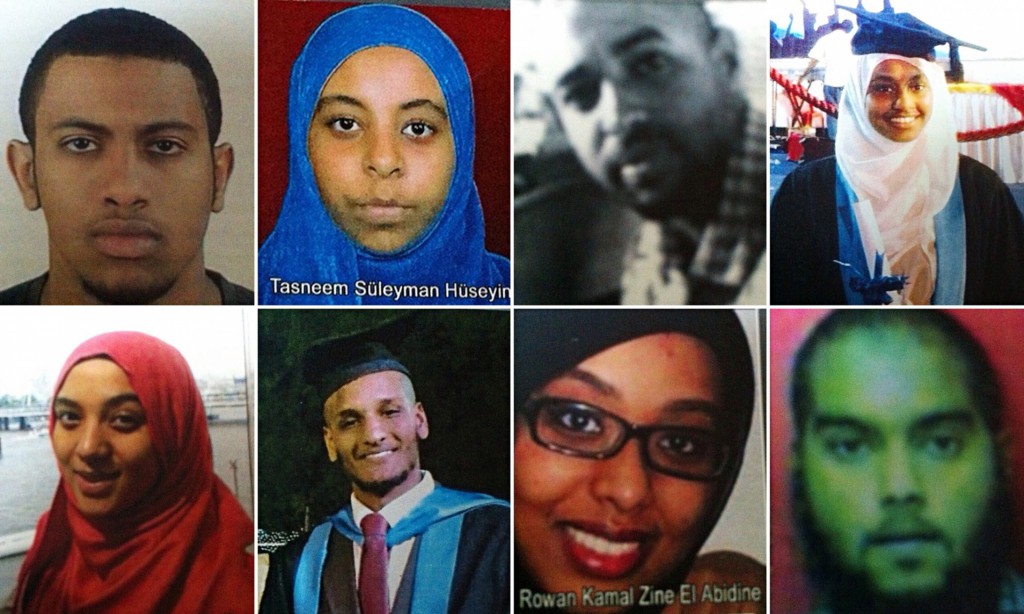Over 600 personer har dratt fra de britiske øyene for å delta i kamper og oppbygging av Den islamske staten. De ni studentene og legene som reiste i forrige uke, var en noe annerledes hendelse som er fanget opp av media. De er i tenårene og begynnelsen av tyveårene, heter det. Alle født i Storbritannia. Men for foreldrene var det tydeligvis viktig å sikre at de forblir i deres eget fødelands mentalitet og religion.
Professor i sosiologi, Sigurd Skirbekk, har sagt at den endelige testen på om tyskere i USA, som utvandret på 18- og begynnelsen av 1900-tallet, var blitt genuine amerikanere, krystalliserte seg i 1940: Var de unge mennene, etterkommerne, villige til å slåss på de alliertes side? Tyskamerikanerne bestod testen med glans. Det samme kan ikke sies om disse ni med britisk statsborgerskap. Om de skal jobbe på sykehus for Den islamske staten, eller delta i væpnede kamper eller annet, spiller ingen rolle for meg. Det hele koker ned kun til det ideologiske valget.
Jeg trodde dessuten at det var mer enn nok for leger å ta seg til på Det afrikanske hornet.
Disse unges valg leder unektelig tankene til hvor stor eller liten er andelen unge muslimer i dagens Europa som vil stå opp mot Den islamske staten? Kanskje politikerne skulle sette seg ned og definere hva de legger i begrepet integrering – og utmeisle en politikk for å nå akkurat det målet?
Det bør også nevnes alle disse lovprisende «talene» om hvor fantastisk det er at eksempelvis på medisinsk fakultet i Oslo er så mange ikke-vestlige, som det heter, og ikke minst fremheves de kvinnelige studentene. Fire av disse ni er unge kvinner:
Nine young British medical students have travelled illegally to Syria and are believed to be working in hospitals in Islamic State-controlled areas, the Observer can reveal. Their families were mounting a desperate effort on Saturday at the Turkish-Syrian border to persuade them to come home.
The group of four women and five men crossed the border last week, apparently keeping their plans secret from relatives until just before entering Syria, when one woman sent her sister a brief message and a smiling selfie.
“We all assume that they are in Tel Abyad now, which is under Isis control. The conflict out there is fierce, so medical help must be needed,” Turkish opposition politician Mehmet Ali Ediboglu told the Observer, shortly after meeting the families.
“They have been cheated, brainwashed. That is what I, and their relatives, think.”
Both he and the students’ parents were convinced that the young medics wanted to work with Isis, Ediboglu said, but they were also certain that the group did not plan to take up arms. “Let’s not forget about the fact that they are doctors; they went there to help, not to fight. So this case is a little bit different.”
The Home Office said that the medics would not automatically face prosecution under anti-terror laws if they tried to return to the UK, as long as they could prove they had not been fighting.
A government source said: “UK law makes provisions to deal with different conflicts in different ways – fighting in a foreign war is not automatically an offence but will depend on the nature of the conflict and the individual’s own activities.”
All of the group are in their late teens or early 20s, with Sudanese roots, and had been enrolled at medical school in Khartoum. Three had graduated and the others were still studying; they may also have travelled with two Sudanese classmates, Ediboglu said.
“These kids were born and raised in England, but they were sent to Sudan to study at medical school,” Ediboglu said. “I’ve asked the families why they sent their children to study there, and as I understood it, they wanted them to experience a more Islamic culture and not to forget their roots.”
They flew from the Sudanese capital to Istanbul on 12 March, took a bus to the border the next day and crossed over soon after, apparently keeping their plans secret from relatives in the UK.
Nineteen-year-old Lena Maumoon Abdulqadir, one of the youngest members of the group, finally alerted her family when she sent a brief message to her sister, but it was too late by then to stop them leaving Turkey.
Syria and Turkey share a porous 500-mile border, one that smugglers have crisscrossed for several years now with recruits and funds for groups fighting the government of Bashar al-Assad. Under mounting US pressure there has been a crackdown on border security, but only in some places; in others passage remains relatively easy.
With Abdulqadir are three other women and five men, who have been named as Nada Sami Kader, Rowan Kamal Zine El Abidine, Tasneem Suleyman Huseyin, Ismail Hamadoun, Tamer Ahmed Ebu Sebah, Mohamed Osama Badri Mohammed, Hisham Mohammed Fadlallah and Sami Ahmed Kadir.
Abdulqadir’s father, Maumoon, bought a ticket to Turkey the evening he heard about her plans, and appears to have emerged as the unofficial leader of the group of seven parents who rushed to Turkey to try to get their children home. “We are all here,” he said when reached by phone at a temporary base in southern Turkey, but said the families did not want to comment further.
In a message to her sister, Lena Abdulqadir said she wanted to “volunteer to help wounded Syrian people”. But both Ediboglu and their families are convinced they are working as doctors with a jihadi group, probably Isis.
“She was living in a land which needs a lot of doctors everywhere [Africa]. Why would she go all the way to Syria for volunteering?” Maumoon Abdulqadir told the Birgün newspaper, which showed him holding a picture of his daughter, smiling in a red headscarf.


